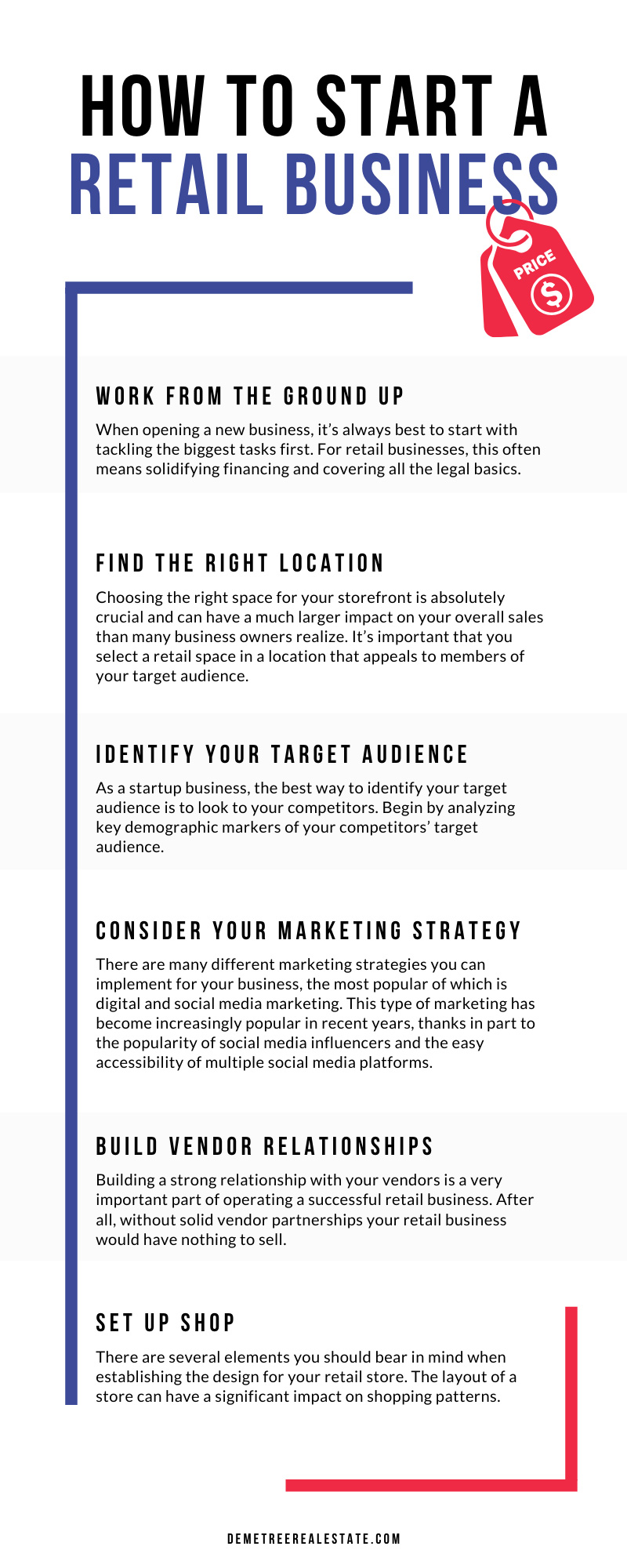 Building a business from the ground up can be a very exciting and lucrative venture. However, it’s also an endeavor that requires a significant amount of planning and preparation in order to be executed well. There are many elements that need to be considered when starting a retail business, many of which take place behind the scenes. Before the doors of a retail store can even open, the business owner must ensure that they cover all their bases and make sure that all logistical elements have been hammered out. For a small business, this can be a lot to manage all at once. In order to make the process a bit more worry-free, we’ve compiled a guide on how to start a retail business that separates the entire process into several simple steps.
Building a business from the ground up can be a very exciting and lucrative venture. However, it’s also an endeavor that requires a significant amount of planning and preparation in order to be executed well. There are many elements that need to be considered when starting a retail business, many of which take place behind the scenes. Before the doors of a retail store can even open, the business owner must ensure that they cover all their bases and make sure that all logistical elements have been hammered out. For a small business, this can be a lot to manage all at once. In order to make the process a bit more worry-free, we’ve compiled a guide on how to start a retail business that separates the entire process into several simple steps.
Work from the ground up
When opening a new business, it’s always best to start with tackling the biggest tasks first. For retail businesses, this often means solidifying financing and covering all the legal basics. Opening a retail store is no small task and it will likely require a significant amount of financial backing in order to get off the ground. Depending on the proposed size of your retail business, you may need to apply for a rather significant loan. This loan could be used to cover the costs of your storefront, as is the case with several commercial real estate types of loans, or may be put toward other general business operational costs. In general, most loans will not cover the entire cost of opening and operating a retail business. As such, you will likely need to contribute a fair amount of your own savings as well. This can be quite a large investment in some cases, but it’s necessary in order to get your business started. You will also need to cover the legal basics of operating a retail business in its early stages. You should acquire a business license for your company, along with any specialized vendor licenses that may be required depending on the type of goods you will be offering. The sale of certain items, including food, liquor, or tobacco products requires a special license in most areas. All licenses should be acquired several months before the grand opening of your business and must be renewed on a regular basis.
Find the right location
When establishing a business, one of the most important things to bear in mind is location, location, location. Choosing the right space for your storefront is absolutely crucial and can have a much larger impact on your overall sales than many business owners realize. It’s important that you select a retail space in a location that appeals to members of your target audience. This will vary depending on the type of goods sold at your store and the purchasing patterns of your key demographic. It is also beneficial to choose a space in a location that receives a significant amount of foot traffic. Window shopping and browsing are very beneficial to new business and can help you get word out about your company much faster. The size and cost of your chosen retail space will also need to be carefully considered, as this can have a significant impact on the size of your loan. In the first year of business it’s often best to rent a retail space rather than buy. To browse available retail space for rent in central Florida, contact our team at Demetree Real Estate Services.
Identify your target audience
As we’ve stated, the location for your retail space will depend greatly on the patterns of your target audience. However, identifying and analyzing the desires of your target audience is sometimes easier said than done. As a startup business, the best way to identify your target audience is to look to your competitors. Begin by analyzing key demographic markers of your competitors’ target audience. Analyze the average age, gender, race, and financial background of your competitor’s customers, as these elements can all have a large impact on an individual’s purchasing patterns. With the background of your target audience in mind, you will be able to make more concrete business decisions that accurately reflect the wants and needs of your consumers.
Consider your marketing strategy
One of the most important tips for how to start a retail business is to establish a solid marketing strategy from the get-go. Without a firm marketing strategy, nobody would know that your business exists. There are many different marketing strategies you can implement for your business, the most popular of which is digital and social media marketing. This type of marketing has become increasingly popular in recent years, thanks in part the popularity of social media influencers and the easy accessibility of multiple social media platforms. Digital and social media marketing are particularly beneficial for retail businesses. This form of marketing enables the company to easily share photos and alerts regarding new products or store discounts. It also allows the company to easily communicate with their customers, leading to better customer service and higher customer satisfaction.
Build vendor relationships
Building a strong relationship with your vendors is a very important part of operating a successful retail business. After all, without solid vendor partnerships your retail business would have nothing to sell. On some occasions it can be hard to get your foot in the door with more established vendors. In such instances, try to first forge a strong relationship with two or three vendors. You may then be able to ask these vendors to recommend your business to others in their industry. Your vendors will feel more comfortable recommending your business because you have already established a sense of trust and reliability through the partnership. Likewise, new vendors will feel more confident entering into a partnership with your company because they will be assured of your professionalism and reliability by fellow vendors in their industry.
Set up shop
Finally comes the fun part of setting up your shop. There are several elements you should bear in mind when establishing the design for your retail store. First, you will need to consider the floor plan and layout of the store itself. The layout of a store can have a significant impact on shopping patterns. Customers will not want to wander countless aisles in search of one small item, so be sure that your store is designed in a way that is conducive to your consumers’ shopping patterns. It’s also important that you consider shelf appeal when designing the layout for your retail business. Best-selling items should be placed in a location where they can be easily seen by consumers and should be highlighted using special lighting, colors, and imagery.

